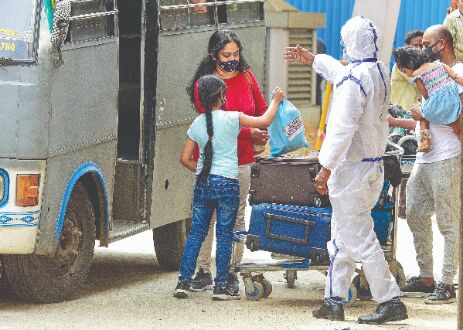New Covid strain found in UK not seen in India so far: Govt

New Delhi: There is no need to panic over the mutated variant of SARS-CoV-2 detected in the UK, the government said on Tuesday, asserting that no such variant or any significant mutation in the Coronavirus strain has been seen in India yet.
NITI Aayog member (Health) Dr V K Paul, during a press briefing, also said the mutated SARS-CoV-2 strain detected in the UK will have no impact on the potential of emerging vaccines which are being developed in India and other countries.
"As of now, based on our discussions, deep understanding of data available and our deep assessment, there is no need to panic but it is a cause to be more vigilant," he said.
Paul said: "This new challenge, we have to counter with our comprehensive efforts", and added: "We will be safe if we suppress the genomic sequence."
There is no change in the treatment guidelines so far due to this mutation and the vaccines that are being developed, particularly those in the country, will not be impacted, Paul said.
This variant of the virus in the UK is defined by a set of 17 changes or mutations, he said and added that its tendency to enter the body's cells has become higher and transmissibility has also increased with the mutation.
"It is also being said that in these viruses, the transmissibility has increased by 70 per cent, you can also call them super spreader in a way. This virus increases infectiousness but does not increase the propensity for death or hospitalisation or severity of the disease. What is affected is the tendency to affect more people that by itself is a cause of concern. It is an adverse development," he said.
Paul said there is no need to "panic" and added that "we are yet to spot such a virus in our country and for which there are intensive efforts in the offing."
He also said: "According to data available with us, we have not detected such mutation in Indian samples and the ones we have detected are insignificant."
However, since mutation in SARS-CoV-2 has been reported in the UK, the government has taken a number of decisions, Paul said.
Passengers who have returned from the UK will be contacted, their clinical issues will be understood and tests will be conducted with specimen subject to genetic sequencing, he said.
In addition, he said that temporary travel restrictions have been imposed to and from the UK.
He urged people to remain vigilant and follow COVID-19 appropriate behaviour like wearing masks and maintaining social distancing to save the gains that the country has achieved in the fight against the COVID-19 pandemic till now.
To a query on the steps taken by the government with regard to people who returned from the UK in the past few days, Union Health Secretary Rajesh Bhushan said thousands of genome sequences have been done during the pandemic.
He said that also, the Bureau of Immigration will share the names of people who had arrived from the UK or had travelled through the UK between November 25 and December 23 with states and Union Territories (UTs).
The State Surveillance Officer will contact, conduct tests and take action as per results, Bhushan said.
The Union Health Ministry on Tuesday also issued standard operating protocols for epidemiological surveillance. These include activities to be undertaken at the point of entry and in the community for all international passengers who have travelled to or through the UK in the past four weeks, from November 25 to December 23.
All passengers coming from the UK from December 21 to 23 would be subjected to the RT-PCR test on arrival and this has to be ensured by respective state governments, the SOP stated. Those found negative in RT-PCR test at the airport would be advised quarantine at home and followed up.
The passengers who are found positive shall be isolated in an institutional isolation facility in a separate unit coordinated by the respective state health authorities. They would earmark specific facilities for such isolation and treatment, it said.
A spike gene-based RT-PCR test should also be performed by an appropriate laboratory in case of a positive sample, the Health ministry recommended.
Also, contacts of such travellers who were found COVID-19 positive at airport testing would be subjected to institutional quarantine and tested according to ICMR guidelines.



